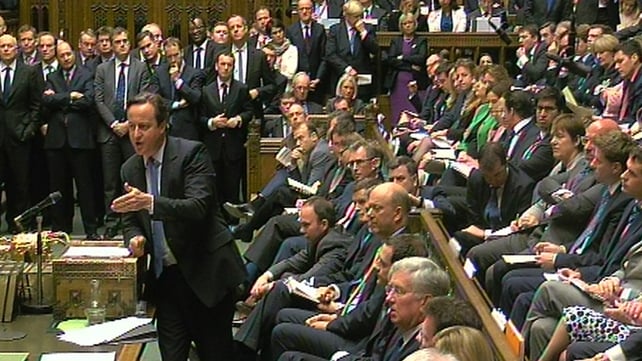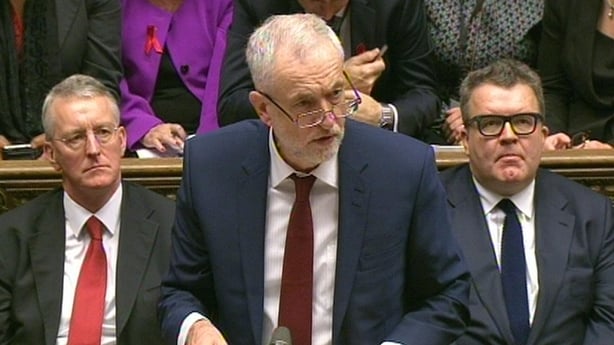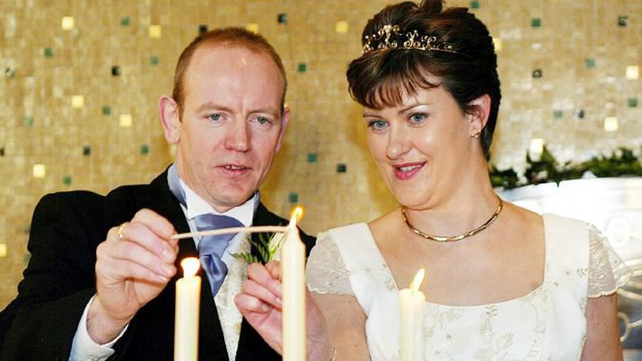British MPs vote to carry out airstrikes on Syria
NEWS •
AN HOUR AGO
 Britain's MPs voted 397 to 223 votes to carry out air strikes against so-called IS militants in Syria
Britain's MPs voted 397 to 223 votes to carry out air strikes against so-called IS militants in Syria
British MPs have given the green light for British pilots to launch bombing raids over Syria after a marathon Commons debate lasting more than ten hours.
David Cameron's motion seeking authorisation to order air strikes against the so-called Islamic State passed by 397 votes to 223, a majority of 174. A rebel amendment was seen off by 179 votes.
While anti-war protests took place outside the Palace of Westminster, the debate saw fierce clashes between the Prime Minister and Labour leader Jeremy Corbyn before 104 contributions from the backbenches.
Labour MPs, granted a free vote following an acrimonious party split over bombing raids, were sharply divided.
Shadow foreign secretary Hilary Benn won applause and cheers across the Commons after a speech advocating military action. Mr Corbyn sat with his arms crossed hours after urging MPs to say no to bombing.
Following the MPs' vote, Royal Air Force Tornado jets could launch bombing raids from the Akrotiri base on Cyprus within hours.
Making his case, Mr Cameron insisted that Britain must decide whether to take on the "evil" of so-called Islamic State in its Syrian heartlands or "wait for them to attack us".
The Prime Minister repeatedly refused to apologise for branding anti-war Labour MPs "terrorist sympathisers" but insisted that he respects those who voted against military action.
He sought to head off criticisms of his case for action, admitting that the 70,000 so-called moderate Syrian rebels were not all ideal partners but saying he was prepared to work with them and insisting that Britain's precision weapons would lead to fewer civilian casualties.
Mr Cameron told MPs: "These women-raping, Muslim-murdering, medieval monsters - they are hijacking the peaceful religion of Islam for their warped ends."
But Labour leader Jeremy Corbyn said air strikes would "almost inevitably lead to the deaths of innocents" and accused the Mr Cameron of rushing a Commons vote through before public opinion turns against military action.

Mr Corbyn questioned whether air strikes would contribute to a peaceful settlement for Syria and warned that they could increase the possibility of terror attacks in Britain.
He said: "Do we send in bombers, not totally aware of what all the consequences are going to be, or do we pause, not send them in, and instead put all of our efforts into bringing about a peaceful, humanitarian and just political settlement faced by the people in Syria?"
SNP Westminster leader Angus Robertson spearheaded an amendment which could have doomed Mr Cameron's plans, telling MPs the Prime Minister's case fell down on the "vital" aspect of whether there were enough ground forces to take and hold IS territory.
Amid dissent on the Conservative benches, former leadership contender David Davis said Turkey and Saudi Arabia should meet their responsibilities as allies of the coalition against the self-styled Islamic State.
He said: "If we want to do something straight away, which will do more than several squadrons of aircraft, it's get our allies to do their job."
Defence committee chairman Julian Lewis mocked Mr Cameron's case for war, telling MPs: "Instead of having dodgy dossiers, we now have bogus battalions of moderate fighters."
But foreign affairs committee chairman Crispin Blunt suggested Mr Cameron was limiting his options and should be asking permission to go further in attacking IS.
He told the Commons: "To my mind, Isil is such a clear and present danger to the civilised world that if all necessary means are endorsed by the security council then so should this House."
For Labour, former foreign secretary Margaret Beckett urged MPs to heed the call of the United Nations and France and recalled successful British military interventions.
She said: "Tell them in Sierra Leone that military action should always be avoided because there would be casualties. Their state and their peace was almost destroyed, it was British military action which brought them back from the brink."
Former soldier Dan Jarvis, Labour MP for Barnsley Central, said: "Daesh are the fascists of our time and I believe there is still a dignity in uniting with our allies in common cause against a common enemy in defence of our common humanity and that is what I hope we will do."
But Father of the House Sir Gerald Kaufman, the Labour MP for Manchester Gorton, insisted: "I am not going to be a party to killing innocent civilians for what will simply be a gesture."
Labour infighting dogged the run up to the crunch debate amid claims of intimidation aimed at MPs backing the Government, and John Woodcock (Barrow and Furness) vowed to do everything he can to stop his party from becoming a "cheerleader" for "angry, intolerant pacifism".
The divisions were laid bare by Mr Benn closing the debate by opposing his leader.
He said: "I believe we have a moral and practical duty to extend the action we are already taking in Iraq to Syria.
"I share the concerns expressed about potential civilian casualties. However, unlike Daesh none of us will act today with the intent to harm civilians - rather, we act to protect civilians from Daesh who target innocent civilians."
Source: Reuters
RELATED AUDIO & VIDEO
British MPs have begun a debate on whether to begin military action against IS
SHARE
TWEET
McAuley jailed for assault on estranged wife
READ NEXT
Desktop Version | Terms & Conditions
© 2015 - RTÉ.ie
By using this website, you consent to the use of cookies in accordance with the RTÉ Cookie Policy. For more information on cookies see our cookie policy.











No comments:
Post a Comment
Note: Only a member of this blog may post a comment.